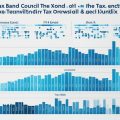Last Updated on: 6th May 2024, 05:18 am
Are you a parent looking to save some money on your taxes? Then you’ve come to the right place! In this blog post, we will dive into the topic of child tax credit – what it is, how it works, and how you can take advantage of this valuable benefit. So grab a cup of coffee and get ready to learn all about how you can put more money back in your pocket while supporting your family. Let’s get started!
What is Child Tax Credit?
Did you know that over 4 million families in the UK receive Child Tax Credit to help support the costs of raising children?
Child Tax Credit is a vital financial lifeline provided by the UK government, offering tax-free assistance to eligible individuals or households with children under their care. If you’re wondering how this benefit works and if you qualify for it, you’ve come to the right place. In this complete guide, we’ll explore the ins and outs of Child Tax Credit, including eligibility criteria, the application process, and the amount of financial support you may receive.
Eligibility Criteria for Child Tax Credit
To be eligible for Child Tax Credit, individuals must already be receiving Working Tax Credit. If someone cannot apply for Child Tax Credit, they may be able to apply for Universal Credit instead. Individuals must also meet other eligibility criteria, such as the responsibility for a child or qualifying young person, and certain age requirements.
Child Tax Credit provides essential financial support to families in the United Kingdom. To determine eligibility, individuals must meet several criteria:
1. Receiving Working Tax Credit
Individuals must already be receiving Working Tax Credit to be eligible for Child Tax Credit. Working Tax Credit is a benefit provided by the UK government to supplement the income of individuals or families who are employed but have low income. If someone is not eligible for Child Tax Credit, they may still be able to apply for Universal Credit as an alternative.
2. Responsibility for a Child or Qualifying Young Person
To qualify for Child Tax Credit, individuals must have the responsibility for a child or a qualifying young person. This means that they are the primary caregiver or financial supporter for a dependent child or young person. The child or qualifying young person must live with the individual or be in their care for a specific period.
3. Age Requirements
Child Tax Credit has specific age requirements for both the child or qualifying young person and the individual applying. The child must be under a certain age, usually 16, and in some cases, up to 20 years old if they are in approved education or training. The individual applying for Child Tax Credit must be at least 16 years old and meet residency requirements in the UK.
Meeting these eligibility criteria is crucial for individuals who wish to receive Child Tax Credit. By ensuring eligibility, families can access essential financial assistance to help with the costs of raising children.
How to Apply for Child Tax Credit?
Applying for Child Tax Credit is a straightforward process that can be done online through the HM Revenue & Customs (HMRC) website. To start your application, follow these steps:
- Visit the HMRC website at https://www.gov.uk/child-tax-credit
- Click on the “Apply for Child Tax Credit” button.
- Provide the requested information about your household, income, and children in the online application form.
- Double-check the accuracy of the information entered before submitting the application.
- After submitting your application, HMRC will review your information and assess your eligibility for Child Tax Credit.
- If eligible, you will receive a notification regarding the amount of tax credit you are entitled to.
It is important to provide accurate and up-to-date information to ensure that your application is processed correctly. Any discrepancies or inaccuracies may delay the assessment process or result in an incorrect determination of your eligibility or tax credit amount.

By applying for Child Tax Credit, eligible individuals can receive financial support to help with the costs of raising children. It is a valuable benefit that can make a significant difference in the lives of families in the UK.
Can I Get a Child Tax Credit?
In order to get Child Tax Credit, you must meet certain eligibility criteria outlined by HMRC. Firstly, you should already be receiving Working Tax Credit. Along with that, you need to be responsible for a child or qualifying young person under your care. Besides these basic requirements, there might be additional conditions depending on your income and personal circumstances.
Child Tax Credit is a crucial financial support provided by the UK government to assist families with the costs of raising children. To ensure that it reaches those who need it the most, HMRC has established specific criteria to determine eligibility for receiving the benefit.
If you meet the eligibility criteria, you can apply for Child Tax Credit and access the financial assistance that it offers. This benefit can significantly help ease the financial burden of raising children, providing additional support tailored to your circumstances.
Whether you are a single parent, part of a low-income household, or facing other financial challenges, Child Tax Credit can be a valuable resource to support your family’s well-being and ensure that your children have access to the financial resources needed for their upbringing.
To find out if you qualify for Child Tax Credit, it is important to review the detailed eligibility criteria set by HMRC. By assessing your situation and determining your eligibility, you can take the necessary steps to access the financial support that Child Tax Credit provides.
Additional Requirements
Aside from the basic eligibility criteria mentioned above, there may be additional requirements that you need to fulfill to be eligible for Child Tax Credit. These additional requirements may include:
- Age requirements for both the child or qualifying young person and the individual claiming the benefit
- Residency status in the United Kingdom
- Income level and calculation methodology
It is important to carefully review each requirement and ensure that you meet all the necessary criteria before applying for Child Tax Credit.
Child Tax Credit Eligibility Requirements
| Eligibility Criteria | Details |
|---|---|
| Receiving Working Tax Credit | You must already be receiving Working Tax Credit to be eligible for Child Tax Credit. |
| Responsibility for a Child or Qualifying Young Person | You must have responsibility for a child or qualifying young person under your care. |
| Additional Requirements | There may be additional requirements based on income, age, and residency status. |
By meeting these eligibility requirements, you can be eligible to receive Child Tax Credit and benefit from the financial support provided by the UK government. It is important to thoroughly review the eligibility criteria and gather all necessary documentation before submitting your application.
How Much Child Tax Credit Will I Get?
The amount of Child Tax Credit you will receive depends on several factors, including the number of children you have and your income. It is important to understand the different elements within Child Tax Credit that contribute to the overall amount you may be eligible for. These elements include:
- The Family Element: This element provides additional support for families with at least one child born before 6 April 2017.
- The Child Element: This element is given for each child you are responsible for, and the amount usually increases with the number of children you have.
- The Disability Element: If you have a child with a disability, you may be entitled to an additional element to help cover the costs associated with their care.
The specific amount of Child Tax Credit you will receive will vary based on your individual circumstances. To get an estimate of the amount you may be eligible for, you can use the Child Tax Credit Calculator provided by HM Revenue & Customs (HMRC). By inputting relevant information about your household and income, you can get an idea of the potential entitlement you may receive.

How Do I Claim Child Tax Credit?
Claiming Child Tax Credit is a straightforward process that requires individuals to complete an application and provide the necessary information to HMRC (HM Revenue & Customs). There are two options available for making a claim:
- Online Application: The most convenient way to apply for Child Tax Credit is by completing an online application on the HMRC website. This allows individuals to provide all the required details electronically and submit the application efficiently. To access the online application, visit the HMRC website and follow the step-by-step instructions.
- HMRC Helpline: If individuals prefer to apply by phone or need assistance with the application, they can contact the HMRC helpline. The helpline advisors are trained to guide applicants through the process, answer questions, and provide support. They will require the same information as the online application, so ensure that all necessary details are readily available when making the call.
When claiming Child Tax Credit, it is crucial to provide accurate and up-to-date information. This includes details about your household, income, and children. By ensuring the information is correct, HMRC can accurately assess and calculate the tax credit entitlement. Incomplete or inaccurate information may result in delays or incorrect benefit calculations.
Remember, the application process for Child Tax Credit may vary based on individual circumstances. It is recommended to review the HMRC website or contact the helpline for specific guidance related to your situation.
Example Claim Form
| Required Information | Explanation |
|---|---|
| Personal Details | Individual’s name, address, date of birth, and National Insurance number. |
| Household Details | Information about the number of people living in the household, including any children or qualifying young persons. |
| Income Details | Details of the individual’s income, including earnings from employment, self-employment, pensions, and other sources. |
| Child Details | Name, date of birth, and other relevant information about each child or qualifying young person. |
| Childcare Costs | If applicable, information about any childcare costs incurred by the individual. |
Child Tax Credit Vs Child Benefit
Child Tax Credit and Child Benefit are two separate forms of financial support provided by the UK government. While both aim to assist families with the costs of raising children, there are key differences between the two benefits.
Child Tax Credit
Child Tax Credit is a means-tested benefit that takes into account the individual’s income. It is designed to provide financial assistance to eligible individuals or households who have children under their care.
The eligibility criteria for Child Tax Credit may vary, but generally, individuals must already be receiving Working Tax Credit to be eligible. Additionally, they must meet other requirements such as being responsible for a child or qualifying young person and meeting certain age requirements.
Child Benefit
Child Benefit, on the other hand, is a universal payment that is available to all eligible individuals with children, regardless of their income. It is not means-tested and is provided to help with the costs of raising a child.
Eligibility for Child Benefit typically depends on factors such as the individual’s residency status, the number of children they have, and their relationship to the child. The payment amount can vary if there are multiple children in the household.
It is worth noting that Child Benefit is subject to an income tax charge for individuals with an annual income above a certain threshold.
Differences in Amount and Eligibility Criteria
The amount of Child Tax Credit an individual is entitled to depends on their income and specific circumstances. It is means-tested, meaning that the payment amount can vary based on factors such as the number of children in the household and the income level.
Child Benefit, on the other hand, has a standard payment amount for each child. The amount may vary if there are multiple children in the household.
In terms of eligibility criteria, Child Tax Credit requires individuals to meet specific requirements, such as being responsible for a child and meeting income thresholds. Child Benefit, on the other hand, is generally available to all eligible individuals with children, with eligibility based on factors such as residency and relationship to the child.
It is important for individuals to understand these differences and assess which benefit they may be eligible for and would provide the most assistance to their family’s financial needs.

Image alt text: Child Tax Credit and Child Benefit – a comparison of two financial support programs for families with children.
Is Child Tax Credit Right for Your Family?
When considering whether Child Tax Credit is the right financial support for your family, it is crucial to assess your individual circumstances. Factors such as your income, the number of children in your care, and your eligibility for other benefits will help determine if Child Tax Credit is the best option to provide the assistance you need.
By carefully evaluating the available support and comparing it with your family’s specific requirements, you can make an informed decision about whether to apply for Child Tax Credit.
1. Consider Your Income
One important aspect to evaluate is your household income. Child Tax Credit is a means-tested benefit, meaning that your eligibility and the amount you receive depend on your income level. Take into account your current earnings and any other sources of income to determine if Child Tax Credit will provide significant financial relief for your family.
2. Assess the Number of Children
If you have multiple children, the amount of Child Tax Credit you receive may increase. The credit includes different elements, such as the family element and the child element, which can vary based on the number of children in your care. Assess the number of children in your family to determine the potential financial benefit that Child Tax Credit can offer.
3. Explore Other Benefits
It’s important to consider any other benefits your family may be eligible for. While Child Tax Credit provides financial support, there may be other programs or allowances that could better suit your family’s needs. Research other benefits available, such as Child Benefit or Universal Credit, and compare them with Child Tax Credit to determine which option provides the most comprehensive support for your family.
| Benefits | Child Tax Credit | Child Benefit | Universal Credit |
|---|---|---|---|
| Eligibility | Based on income, number of children, and other factors | Available to all eligible individuals with children | Dependent on circumstances and income |
| Financial Support | Means-tested, varies based on income and circumstances | Universal payment, not means-tested | Varies based on individual circumstances |
| Application Process | Apply through HMRC | Apply through the government website or by post | Apply through the government website or over the phone |
| Additional Benefits | Potential eligibility for other tax credits | May qualify for other support programs | Potential eligibility for other elements included in Universal Credit |
By carefully considering these factors and comparing the benefits and eligibility criteria of different support programs, you can make an informed decision about whether Child Tax Credit is right for your family. It’s essential to assess your unique circumstances and choose the option that provides the most comprehensive support to help meet your family’s financial needs.
Child Tax Credit Calculator
Do you want to estimate the amount of tax credit you may be eligible to receive? The Her Majesty’s Revenue and Customs (HMRC) provides a convenient online Child Tax Credit calculator. By inputting relevant information about your household and circumstances, you can get an estimate of your potential entitlement.
The Child Tax Credit calculator takes into account various factors, such as the number of children you have and your income. It provides an estimation of the tax credit amount you may be eligible for, helping you plan your finances accordingly.
Using the Child Tax Credit calculator is easy and straightforward. Simply follow these steps:
- Visit the HMRC website.
- Navigate to the Child Tax Credit calculator page.
- Enter the required information, including your household size, income, and other relevant details.
- Submit the information and wait for the calculator to generate your estimate.
The estimate provided by the Child Tax Credit calculator can give you a better understanding of the financial support you may receive, based on your circumstances. It can help you plan your budget, make informed decisions, and ensure you are aware of the potential tax credit you may be entitled to.
If you have any questions or need assistance while using the Child Tax Credit calculator, you can contact the HMRC helpline for guidance and support. The helpline is available to provide clarifications on the calculator’s usage and help address any queries you may have regarding your eligibility or entitlement. Take advantage of this valuable tool to gain insights into your potential Child Tax Credit amount!
Changes in Child Tax Credit
Child Tax Credit is a government benefit that assists families with the financial costs of raising children. However, it’s important to stay updated on any changes in legislation and government policies that may impact Child Tax Credit eligibility or the amount of support individuals receive.
Changes in Child Tax Credit can be introduced to address evolving societal needs or to align with broader welfare reforms.
Recent Changes
Over the years, there have been several significant changes in Child Tax Credit. From the introduction of Universal Credit to adjustments in income thresholds and entitlement criteria, it’s crucial to stay informed about these changes to navigate the child support system effectively.
Some key recent changes in Child Tax Credit include:
- Phasing out Child Tax Credit for new claimants and transitioning to Universal Credit
- Lowering the income threshold and introducing a two-child limit for new claimants
- Introduction of the High-Income Child Benefit Tax Charge for higher earners
It’s important to note that the above changes may impact the eligibility and amount of support individuals receive. It’s recommended to regularly check the official government website or consult with HM Revenue & Customs (HMRC) for the most up-to-date information on Child Tax Credit.
Staying informed about changes in Child Tax Credit ensures individuals are aware of any new requirements, potential limitations, or additional support available to them.

Assessing the Impact
When changes occur, it’s essential to assess their impact on personal circumstances. This involves understanding how changes in legislation or government policies affect Child Tax Credit eligibility, entitlement, and overall financial support.
Individuals should review their current situation and consider the following:
- Does the change affect personal eligibility for Child Tax Credit?
- Will there be any adjustments to the amount of support received?
- Are there alternative benefits or assistance programs to explore?
By evaluating the impact of changes in Child Tax Credit, individuals can make informed decisions and seek additional support if necessary.
Seeking Advice
If individuals have any concerns or require further clarification regarding changes in Child Tax Credit, it’s advisable to seek expert advice from professionals or contact the HMRC helpline.
Relevant government agencies can provide tailored guidance on navigating the changes, ensuring individuals receive accurate information and understand how it affects their specific circumstances.
In Summary
Changes in Child Tax Credit are a regular part of government policy and welfare reforms. Staying informed about these changes is vital to understand the impact on eligibility and financial support levels.
By staying up-to-date and seeking advice when needed, individuals can effectively manage their entitlements and make informed decisions about their family’s finances.
Renewing Child Tax Credit
If you are already receiving Child Tax Credit, it is important to renew your claim annually to ensure that your information is up-to-date and to continue receiving the benefit. HMRC (Her Majesty’s Revenue and Customs) will usually send a renewal pack with instructions on how to renew your claim.
Renewing your Child Tax Credit claim is a straightforward process that ensures your eligibility for continued support. It involves updating your personal and financial information to reflect any changes that may have occurred during the previous year.
Renewal Process
The renewal of your Child Tax Credit claim typically involves the following steps:
- Receipt of Renewal Pack: HMRC will send you a renewal pack that contains important information about the renewal process. It will include a unique reference number and instructions on how to complete your renewal.
- Verification of Details: Review the information provided in the renewal pack and ensure that it accurately reflects your current circumstances. Check for any changes in your personal and financial situation that need to be updated.
- Providing Additional Information: If there are any changes to report, provide the necessary additional information requested by HMRC. This may include updated income details, changes in household composition, or any other relevant information.
- Submission of Renewal: Once you have reviewed and updated the necessary information, submit your renewal application to HMRC. The renewal can be completed online or by mail, depending on your preference and the instructions provided in the renewal pack.
It is important to complete the renewal process within the specified timeframe to ensure uninterrupted support. Failure to renew your claim may result in the suspension or termination of your Child Tax Credit payments.
After submitting your renewal application, HMRC will assess the information provided and determine your eligibility for continued Child Tax Credit. If any discrepancies or issues arise, HMRC may contact you for further clarification or documentation.
Renewing your Child Tax Credit claim allows you to maintain access to the financial support that helps you meet the costs of raising your children. By keeping your information up-to-date, you can ensure that your entitlement is accurately calculated and that you continue to receive the full benefits you are eligible for.
Child Tax Credit Helpline
If individuals have any questions or need assistance regarding Child Tax Credit, they can contact the HMRC Child Tax Credit helpline. The helpline is available to provide guidance and support regarding the application process, eligibility criteria, and any other queries related to Child Tax Credit.
Whether you’re unsure about the eligibility requirements, need help with filling out the application form, or have inquiries about your entitlement, the dedicated Child Tax Credit helpline is there to assist you. The knowledgeable and friendly helpline team can address your concerns and provide the necessary information to ensure a smooth and successful experience with Child Tax Credit.
So, if you have any questions or concerns about Child Tax Credit, don’t hesitate to reach out to the HMRC helpline. The experts are ready to help and guide you through the process, ensuring that you receive the support you need to navigate the complexities of Child Tax Credit effortlessly.
Conclusion
In conclusion, the child tax credit is an important resource for families to help alleviate financial burdens and provide support for raising children. With this tax credit, eligible taxpayers can receive a significant reduction in their tax liability, allowing them to invest more into their children’s well-being and future. It is crucial for parents or guardians to understand the qualifications and regulations surrounding this credit in order to fully utilize its benefits. The government recognizes the importance of supporting families and this tax credit serves as a tangible representation of that support.




















No Comments
Leave a comment Cancel